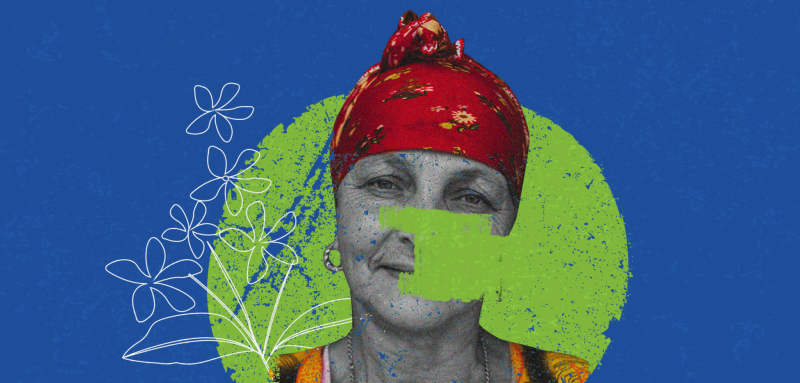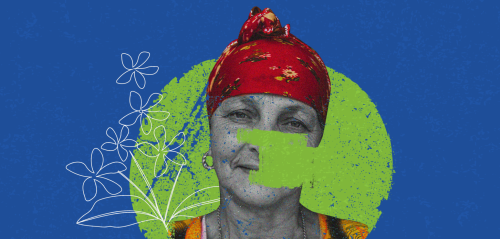I met her on a cold rainy day, sitting in the lobby of the neighborhood’s public health institution – the Aïn el Khébira’s EPSP Administration – in Bab Ezzouar (an eastern suburb of Algiers), holding her wooden cane in her right hand and a white bag full of medicine in the left hand. Sorrow was etched onto her face, which was covered with aging lines and wrinkles, and she spoke in a rough, hoarse voice coming from an emaciated body that could no longer meet life and its troubles head on.
Dreams Are a Mirage
I sat next to her to inquire and ask after her worries. It appeared difficult at first because it seemed she didn’t have the strength to speak. Auntie Zeina, in her sixties, tells Raseef22, “I have three daughters and a son. I never expected that the moment would come when my son would accompany me; I was even scared for him from any type of hurt and pain. His childhood passed by in the blink of an eye and suddenly, he was a man and reached the age of marriage. He chose his own life partner, while I was engrossed in my dreams, waiting for his children to arrive so I could hear their crying and enjoy them playing in the house’s yard in order to fill the void my three daughters left behind after they got married. Even his father, a sixty-year-old elderly man, shared those same feelings and sentiments with me.”
After she had gathered her breath and held back her tears that had not stopped falling from her honey-colored eyes that were clouded by darkness, the old lady said, “My dreams all turned into a mirage because my son left, carrying his bags along with the memories of his childhood with him, after problems were worsened by his wife who was inciting him against me, his sisters, and his father. All of a sudden, his treatment towards me changed. He stopped wanting to talk to me when I had once been his trusted secret-keeper. He began to mistreat me, and he forgot that I had often gone through pain and hardship to please him.”
She adds, “I yearn today to be able to smell anything I can of him, to have one glimpse of his face and see his young, youthful laughter that would cover his features. My heart burns from this intense longing, my life is shortened day by day, and every day that I do not spend with him, my body breaks more and more.”
The elderly lady has entered a state of severe depression, also suffering from illnesses and mental disorders that surface to plague her from time to time. She is unable to sleep and can only do so after taking some sleeping pills made available with a doctor’s prescription so that she can forget the chronic pain that dwells in her heart and refuses to leave it.
They Isolated Her, A Lifeless Corpse
A mother that had reached old age, and that fate had destined for her to say goodbye to life in silence without anyone hearing her, until she was found a lifeless body in her apartment. This is the story of an elderly woman narrated by Dalila Hussein, president of the Nour Association for Women, Family and Children.
After she was widowed, she took over all responsibilities, so she became both mother and father at the same time. She went out to work despite the criticism and condemnation – as well as the sharp tongues and dirty eyes – that were surrounding her from every angle, in order to get the necessary money to meet her needs and the needs of her young children. Despite the cruelty of time and its effects on her life, she refused to ever bow down or weaken, but rather, it gave her strength and a will to endure all of life’s difficulties for the sake of her children who had found themselves without a father at such an early age.
“When she got old, her 3 sons abandoned her in a tiny room. No one was concerned about her needs or checked on her, until someone smelled a foul stench and discovered it was their mother’s corpse
When she grew old, her three sons abandoned her and isolated her in a tiny room – no one asking after her needs or checking in on her. Everyone was just preoccupied with his own wife and children, until she was found a lifeless corpse on her bed – she had gone completely unnoticed until a foul stench began emanating from her room.
Another mother, according to Hussein, spent her final days on the side of the road, sitting alone, endless tears streaming down her face over a time long past, after her son and his wife abandoned her. His wife, who’s heart was filled with jealousy and became extremely envious of her, could not even bear her mere presence in the house, so she incited the son against his own mother.
Hussein says, “This 70-year-old mother was found by the side of the road, just moments before iftar time [when Muslims break their fast] during the month of Ramadan, after her son and his wife abandoned her, even though the villa they live in within Hydra (in the heights of the Algerian capital) belongs to her.”
She adds, “After her son refused to take care of her, she was forced to stay in a nursing home (for the elderly), where she is currently spending the remainder of her aging days with other elderly women who share her same pain and suffering.”
The feminist activist Dalila Hussein attributes the reasons for the recent prevalence of such behavior in Algerian society to the “secrecy” held up by parents in an attempt to avoid and ward off scandal. She says, “The Algerian legislature has adopted a set of legislations meant to protect all male and female elderly alike, as well as ensure their livelihood within the family setting, enjoying their dignity and stature. It also fights all forms of the abandonment of elderly parents – with penalties that may reach up to jail sentences at times, especially when it comes to cases of infringing on assets, which have begun to invade the corridors of Algerian courts.”
Hussein invokes Article 77 of the Algerian Family Law (Code de la famille), stating that “Alimony for elderly parents who have no income or whose income is weak ‘is obligatory on sons’. The penal provisions stated in Article 32 of this law stipulate the application of custodial penalties, such as imprisonment from six months all the way to eighteen months in the case the senior was exposed to risk or danger.”
“In addition, Article 267 of the Algerian Penal Code – with regard to assault and intentional wounding – states that whoever intentionally strikes or hits his legal parents and it does not lead to the inability to work, shall be punished with imprisonment from five to ten years. As for whoever beats his parents and causes dismemberment or the amputation of a limb, he is punished with 10 to 20 years in prison, but if the beating leads to death (without the intent for murder), the perpetrator shall be punished with a life sentence in prison.”
However, commenting on the enforcement of these laws, Hussein says, “Usually, parents cover up for their children, and they withstand harm and suffering out of fear of scandal and sometimes out of love for their children.”
She adds that this reason pushes them today to think about family mediation, and that it must be undertaken by the civil society in order for issues to be smoothly resolved without resorting to the courts. This is made possible through the use of programs, initiatives, and projects in which specialists in Sharia, psychology, sociology, and law may participate, in order to solve such complex problems and issues.”
The Situation of Elderly Women is Complicated
Psychiatrist Hoda Makhloufi describes the situation of elderly women as “complicated” due to the many diseases that may plague them as a result of familial problems – especially the recent phenomenon of disobedience, which has spread widely in Algerian society. She tells Raseef22, “Any hormonal imbalances, in addition to changes in food quality and diet, as well as older women feeling a great decline in their social role, makes them vulnerable to various diseases, anxiety, emotional outbursts and distress. They could even lead to even cancer – especially breast cancer, which is formed as a result of accumulations of psychological stress that generate negative hormonal substances – in addition to diseases resulting from a weak immune system.”
Article 77 of the Algerian Family Law (Code de la famille), states that alimony for elderly parents who have no income or whose income is weak is obligatory on sons.
She goes on, “Many elderly women do not adapt to their sixties, and resort to subconscious methods that affect their psyche, make them lose the pleasure in life, and leave their thinking in a position and state much closer to death, as some of them lose their social role and even their productive energy completely.”
According to the available data provided in the field, Hoda confirms that nearly 65 percent of elderly women suffer from various chronic diseases, such as heart disease, arterial diseases, diabetes, and high blood pressure. They also suffer from a number of emotional and mental disorders, which are formed as a result of sadness, grief and loneliness, that all result from conflicts, incidents, as well as past and unfortunate memories.
One of the most common and circulated stories in Hoda’s clinic is the story of an Algerian woman in her sixties, who had a past full of “feats, heroics, and decisive situations throughout her family life” due to the absence of her husband, who was away working in an oil field in the south of the country. However, upon his return, he became the one calling the shots and holding the reins of the household, while she no longer had any significant role, “her presence became the same as her absence, and this caused her to suffer from severe mental illnesses that are difficult to treat in most cases.”
Speaking on the issue of elderly women seeking refuge in geriatric centers and nursing homes due to the lack of psychological care for them, Hoda says, “Most of them withdraw from social activities due to their diminishing capacities for giving as well as interaction within the social system. Therefore, we find many of them alone, awaiting the end and the inevitable demise.”
Hoda Makhloufi stresses the need to preserve the dignity of the elderly – male and female alike – and provide a familial atmosphere for their care, which enables them to achieve psychological harmony. Their social and domestic desires must also be satisfied by consolidating their relationship with their relatives and continuously incorporating them on occasions and holidays, and not leaving them alone to grapple with both the past and the future at the same time. It is also vital to launch awareness campaigns on emotion dealing and interaction, establish certain places to receive the elderly, and urge them to carry out activities so that they can feel their productive capabilities in society.
Raseef22 is a not for profit entity. Our focus is on quality journalism. Every contribution to the NasRaseef membership goes directly towards journalism production. We stand independent, not accepting corporate sponsorships, sponsored content or political funding.
Support our mission to keep Raseef22 available to all readers by clicking here!
Interested in writing with us? Check our pitch process here!






